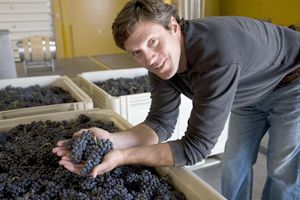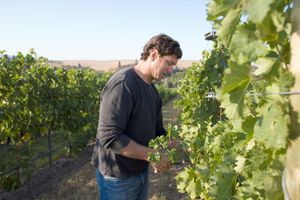Quarterback to Doubleback


Born in Ellensburg, Wash., Drew Bledsoe spent most of his childhood in Walla Walla, Wash. He graduated from Walla Walla High School in 1990 and then attended Washington State University on a football scholarship while majoring in English.
During his junior season at WSU, Bledsoe broke multiple school records and made the decision to forego his senior year to enter the NFL draft. He was the number one overall draft pick in 1993 and signed on to play with the New England Patriots.
After announcing his retirement from a 14-year career in the NFL in April of 2007, he quickly found his footing in a new career: wine.
Returning to his hometown roots, Bledsoe planted McQueen Vineyard outside Walla Walla in the spring of 2007 and launched Doubleback Winery. Childhood friend Chris Figgins is currently the leading winemaker and consultant for the winery. The wine is made at Artifex Wine Company, a custom crush facility in Walla Walla. Bledsoe is currently working on plans for his own winemaking facility at McQueen Vineyard.
Bledsoe currently lives in Bend with his wife, Maura, and their four children. He is actively involved with his family, in the community and with many philanthropic organizations. He spends his summers in Whitefish, Montana.
OWP: When and how did you get interested in wine?
DB: My wife, Maura, and I started to figure out that wine was a far more interesting beverage to enjoy with dinner during my first couple of years in the NFL. Prior to that we had been more into the beer, etc.
We took our first trip to Napa in 1998, and that is when I really caught the bug. The whole process was so interesting to me. First you are a farmer, then you are a winemaker, then you get into marketing and fulfillment, etc. It is a multi-faceted business that can keep you occupied for a lifetime.
OWP: What are your goals and/or plans for the winery?
DB: We would eventually like to see our production at 4,000 to 5,000 cases. This is what we consider the top end of the “small winery,” in terms of production. We can still maintain very tight quality control at this level but actually see it turn into a business that makes a little money. We intend to stay focused on just one wine: Doubleback Cabernet. We may offer a few side products to our mailing list, but we want to make sure that Doubleback maintains our full attention.
OWP: Are you hands-on in the winery?
DB: I am generally at the winery a couple times a month. I rely heavily on Chris Figgins to make the day-to-day decisions in order to achieve the best possible product we can. I give him the “big picture” directions of where we want to end up, and he executes. I can’t imagine a better partner in this endeavor.
Chris continues to do a perfect job. I tell people that if I had to dumb it down to football terminology, I am the owner and general manager; Chris is the coach and quarterback. I tell him what kind of wine I want to end up with and sign the checks; he makes all the thousands of decisions required to achieve that goal. It works.
OWP: What is your philosophy when it comes to wine and/or winemaking?
DB: My philosophy is fairly simple. The vineyards of the Walla Walla Valley, and particularly our vineyard sources, are producing some of the best wine grapes in the entire world. If we just get out of the way, the wines will be great.
While Chris is obviously fabulous in the winery, he will tell you that he feels that his true expertise is in the vineyard. We spare no expense in ensuring that the grapes we harvest are the best expression of that particular piece of ground. Our oak program reflects our focus on the fruit. We use 100 percent French oak and only 50 percent new. This allows the purity of the fruit to shine through with the oak simply serving as a frame for the art.
OWP: Explain the name of your winery?
DB: The name Doubleback is pretty simple. I grew up in Walla Walla and then went off on a crazy football deal. When that was over, I “doubled back” to Walla Walla. It also happens to have my initials, DB.
OWP: Who are your favorite producers from Washington and Oregon?
DB: Leonetti is obviously at the top of the list. I also enjoy L’Ecole, Woodward Canyon, Gramercy Cellars, Cayuse, Pepper Bridge... In truth, I can’t tell you of a single wine I have tasted from Walla Walla that has been a disappointment. We don’t drink a ton of white wine, but Abeja makes my favorite Chardonnay in the world.
I’m a big fan of all of the Oregon Pinots. Particularly in 2008. Some recent tastes include Bergström, Beaux Frères, Cristom, Rex Hill, Elk Cove. (Come to think of it, I have been drinking a lot of Oregon Pinot!)
OWP: Any plans to experiment in the vineyard? If so, what varieties would you like to grow?
DB: We are currently planning to stay focused on the three varietals that make up Doubleback: Cabernet Sauvignon, Merlot and Petit Verdot. We have discussed some Cab Franc and some Malbec, but I really like the profile we have defined for DB, and I want to stick with that.
OWP: How many cases did you make last year? With the wine in barrel, what do you think of the 2010 vintage?
DB: It looks like the 2009 and 2010 vintages will end up fairly similar in case production. We had quite a few more acres for 2010 (including the first harvest from our McQueen Vineyard) but the late cold spring gave us a significantly smaller crop. Both vintages are shaping up to be great ones.
While 2008 looks to be a truly special vintage, I don’t think there will be much of a letdown for ’09 and ’10. Our unique little valley just continues to reward us year after year. It is a special place for a lot of reasons, but the terroir is particularly great.
OWP: Any parallels between winemaking and football?
DB: There are some great parallels and significant differences between football and winemaking. The greatest parallel is that the little things make all the difference. Small, seemingly insignificant decisions can make the difference between greatness and mediocrity. They are both highly competitive businesses with passionate people. Both require a great team to be successful.
The greatest difference is that, in football, you know the results of your decisions almost instantly. If I threw a bad pass that ended up in the wrong hands, immediately I knew it was a bad decision. In winemaking, you may not know the results of a decision for three to seven years! Again, having an experienced, smart guy working for you is an absolute necessity. Go Figgins!










